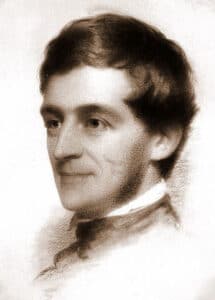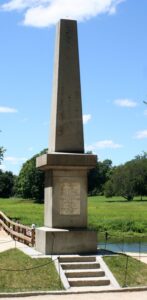Emerson wrote one of the most famous lines in American history
Martin Van Buren had just been inaugurated as president, the day after President Andrew Jackson and Congress recognized the new Republic of Texas. The Whigs were establishing themselves as a new political party, having held their first national convention in Pennsylvania. Business conditions were unsettled, following the Panic of 1837 in which numerous banks had failed.

Emerson in 1830s
On July 4, 1837, a large group gathered in Concord, Massachusetts, to commemorate the Battle of Lexington and Concord in 1775, the Declaration of Independence in 1776, and the American Revolution (1775-1783). The Concord Battle Monument Committee had commissioned a stone obelisk for the occasion, along with a poem by Ralph Waldo Emerson (1803-1882). The monument was unveiled, and Emerson read his poem, originally entitled “Hymn: Sung at the Completion of the Concord Monument.”
Emerson, known as the father of Transcendentalism, had moved to Concord in 1834 and quickly become a leading citizen. The committee commissioned a poem, and he apparently finished it in 1836. For the unveiling ceremony, the poem was first read and then sung by a choir to the tune of “Old Hundredth.” (Calling it a hymn immediately elevates the subject of the Battle of Lexington and Concord to a sacred status.) It was also printed as a broadside and distributed at the ceremony. The monument itself is situated very close to where the battle actually happened.
Many newspaper accounts of the unveiling included the poem. Emerson himself didn’t officially publish the poem until 1848, when he included it in the first edition of Poems. The poem, four quatrains (stanzas of four lines), contains one of the most famous lines in American literary, cultural, and social history.
Concord Hymn

Concord Monument; photo by David Pape, Public Domain
By the rude bridge that arched the flood,
Their flag to April’s breeze unfurled,
Here once the embattled farmers stood
And fired the shot heard round the world.
The foe long since in silence slept;
Alike the conqueror silent sleeps;
And Time the ruined bridge has swept
Down the dark stream which seaward creeps.
On this green bank, by this soft stream,
We set today a votive stone;
That memory may their deed redeem,
When, like our sires, our sons are gone.
Spirit, that made those heroes dare
To die, and leave their children free,
Bid Time and Nature gently spare
The shaft we raise to them and thee.
This is the vision of the “minutemen,” the farmers, laborers, and shopkeepers who quickly assembled to fight the British troops sent to march into the two Massachusetts towns and seize weapons from the citizens, in an effort to head off rebellion. The Americans won; Emerson’s grandfather had witnessed the battle and so there was some personal history involved for the poet.
Both the battle and Emerson’s poem, with its “shot heard round the world,” have passed into American mythology. The poem is the best known of all of Emerson’s writings. The Revolutionary generation was nearly gone, these heroes who died “to leave their children free.” The poem bridged the people of the 1830s to that earlier time, an age now deemed heroic by poems like Emerson’s.
The poem also looks forward. What the minutemen accomplished that day in 1775 will be remembered when “like our sires, our sons are gone.” It suggests that, even in the darkest times, we are still members of that Revolutionary generation; we carry the genes, the memory, and the spirit.
Related:
Longfellow, Whitman, Wheatley: Whatever Happened to Patriotic Poems?
Out Best-Known Patriotic Poem: Longfellow Visits a Church
What Freedom Means to You (and Me)
Photo by Chris Patako, Creative Commons, via Flickr. Post by Glynn Young.
How to Read a Poem uses images like the mouse, the hive, the switch (from the Billy Collins poem)—to guide readers into new ways of understanding poems. Anthology included.
“I require all our incoming poetry students—in the MFA I direct—to buy and read this book.”
—Jeanetta Calhoun Mish
- Poets and Poems: Sandra Marchetti and “Diorama” - April 24, 2025
- Poets and Poems: Christina Cook and “Roaming the Labyrinth” - April 22, 2025
- Longfellow’s “Paul Revere’s Ride”: Creating a National Legend - April 17, 2025


Leave a Reply